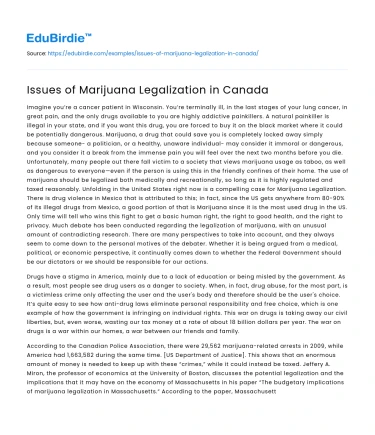Imagine you’re a cancer patient in Wisconsin. You’re terminally ill, in the last stages of your lung cancer, in great pain, and the only drugs available to you are highly addictive painkillers. A natural painkiller is illegal in your state, and if you want this drug, you are forced to buy it on the black market where it could be potentially dangerous. Marijuana, a drug that could save you is completely locked away simply because someone- a politician, or a healthy, unaware individual- may consider it immoral or dangerous, and you consider it a break from the immense pain you will feel over the next two months before you die. Unfortunately, many people out there fall victim to a society that views marijuana usage as taboo, as well as dangerous to everyone—even if the person is using this in the friendly confines of their home. The use of marijuana should be legalized both medically and recreationally, so long as it is highly regulated and taxed reasonably. Unfolding in the United States right now is a compelling case for Marijuana Legalization. There is drug violence in Mexico that is attributed to this; in fact, since the US gets anywhere from 80-90% of its illegal drugs from Mexico, a good portion of that is Marijuana since it is the most used drug in the US. Only time will tell who wins this fight to get a basic human right, the right to good health, and the right to privacy. Much debate has been conducted regarding the legalization of marijuana, with an unusual amount of contradicting research. There are many perspectives to take into account, and they always seem to come down to the personal motives of the debater. Whether it is being argued from a medical, political, or economic perspective, it continually comes down to whether the Federal Government should be our dictators or we should be responsible for our actions.
Drugs have a stigma in America, mainly due to a lack of education or being misled by the government. As a result, most people see drug users as a danger to society. When, in fact, drug abuse, for the most part, is a victimless crime only affecting the user and the user's body and therefore should be the user's choice. It’s quite easy to see how anti-drug laws eliminate personal responsibility and free choice, which is one example of how the government is infringing on individual rights. This war on drugs is taking away our civil liberties, but, even worse, wasting our tax money at a rate of about 18 billion dollars per year. The war on drugs is a war within our homes, a war between our friends and family.
Save your time!
We can take care of your essay
- Proper editing and formatting
- Free revision, title page, and bibliography
- Flexible prices and money-back guarantee
According to the Canadian Police Association, there were 29,562 marijuana-related arrests in 2009, while America had 1,663,582 during the same time. [US Department of Justice]. This shows that an enormous amount of money is needed to keep up with these “crimes,” while it could instead be taxed. Jeffery A. Miron, the professor of economics at the University of Boston, discusses the potential legalization and the implications that it may have on the economy of Massachusetts in his paper “The budgetary implications of marijuana legalization in Massachusetts.” According to the paper, Massachusetts would save $120.6 million annually in government expenditure towards criminal justice enforcement. Similarly, the state would also yield tax revenue of $16.9 million annually. [Miron]
There is a lot of smoke around marijuana (pun intended). There are many myths, but just as many facts to counter it. Myth: Marijuana can be highly cancerous. A UCLA study found that even long-term smoking of Marijuana has minimal lung damage, and thus little chance of lung cancer. In other words, the risk is minuscule. Myth: Marijuana Contains OVER 400 Chemicals. This is no myth, as the average cup of coffee contains well over 1,500, and Rat Poison contains 30. None of the chemicals in Marijuana are identified as seriously dangerous. Myth: Marijuana is a ‘Gateway’ Drug. This is a theory that is pressed and pressed by anti-marijuana advocates to scare people off. In fact, the US Gov’t’s own studies have shown that about 3 in 4 people NEVER go on to use harder drugs, and a majority of those 25% are actively in this climate- for many, Alcohol or Tobacco are those ‘gateway’ drugs even before Marijuana. This is a problem that cannot be ignored, with or without Marijuana legalization. Myth: Marijuana is addicting. Marijuana is not actually PHYSICALLY addicting. Alcohol, Tobacco, and Caffeine have been shown to be more habit-forming than Marijuana, according to the American Medical Association. Myth: Marijuana Usage impairs learning ability/motor skills. A breakthrough study in 1996 in California found that heavy marijuana usage may impair learning ability. Notice the words HEAVY and MAY. Even with heavy usage (which constitutes less than 5% of the population according to the study), impacts were found to be subtle and only temporary. Casual (1 a day or less) users showed little to no impairments whatsoever. That also takes out a substantia






 Stuck on your essay?
Stuck on your essay?

